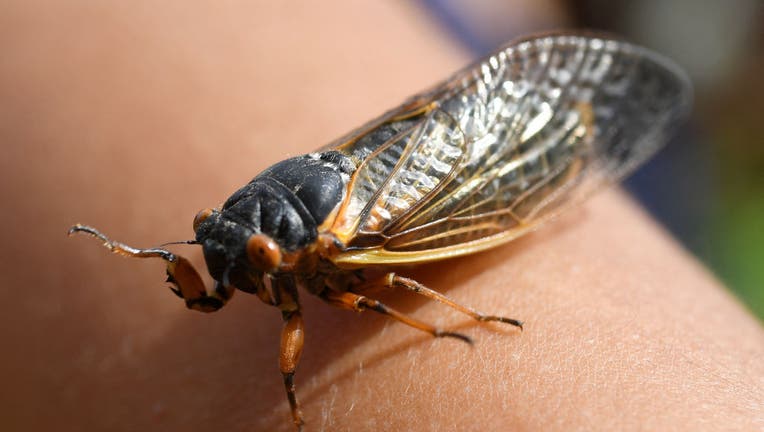How loud do cicadas get?

A Magicicada periodical cicada rests on the arm of a child on May 16, 2021 in Arlington, Virginia. Before invading parks and people's gardens, the insects have already conquered the airwaves, social media and newspapers, especially in parts of the ea
LOS ANGELES - As spring nears, the anticipation grows as America readies for the emergence of over a trillion cicadas. This event signifies a significant moment as it's the first instance in over two hundred years that two broods are anticipated to emerge from underground across 17 states nationwide.
Get ready for the deafening buzz that accompanies the arrival of cicadas. As a trillion of these zombie-like insects emerge all at once, brace yourself for a cacophony.
But what's the decibel level of this insect orchestra, and when should you consider reaching for those earplugs?
RELATED: 'Cicada-geddon': How close are we to the 2024 cicada explosion?
How loud will the cicadas be?
Cicadas can produce sound levels ranging from around 80 to 120 decibels (dB) when measured at close range. The specific loudness varies depending on factors such as species, environmental conditions, and individual cicada behavior.
Some species of cicadas, such as those found in Africa, are known to be among the world's loudest insects, with their calls reaching close to 107 decibels.
In North America, certain cicada species can generate calls reaching around 100 decibels or more, which is comparable to the noise level of a lawnmower or passing jet aircraft, according to University of Illinois researchers.
Police: Cicadas cause car crash in Ohio as Brood X swarms
Police in Cincinnati, Ohio responded after a car hit a pole on June 7th. The driver said he thinks a cicada flew inside the vehicle through the window and hit him in the face. Thankfully, the driver is fine and sustained only minor injuries, but the car was badly damaged. Brood X, as the cicada event is known, emerged from the ground after 17 years. The insects can be seen up and down the eastern and midwestern U.S. as the nation hits peak summer months.
However, while their buzzing may be bothersome, cicadas are generally harmless creatures.
Maybe don't stand too close
The U.S. Centers for Disease Control and Prevention (CDC) warns that exposure to cicada buzzing for just 15 minutes can lead to noise-induced hearing loss.
But don't worry.
Exposure to loud noise, like the sound of cicadas, for a single instance, even if it surpasses the safe duration, may not necessarily result in hearing damage.
Most instances of noise-induced hearing loss occur due to repeated exposure to dangerous noise levels. In rare situations, an extremely loud and sudden noise, such as a gunshot or a close blast, can cause immediate hearing damage.
READ MORE: 2024 is the year of the double cicada emergence, a 'simultaneous explosion of bugs'
Sometimes, a single exposure might lead to a temporary change in hearing. However, similar to wearing down grass by walking over it repeatedly, permanent hearing damage typically occurs from repeated noise exposures over time.
Why are cicadas so loud?
Cicadas produce loud sounds primarily to attract mates. The loud, buzzing noise is generated by male cicadas, who have special structures called tymbals on their abdomen.
They rapidly contract and release these tymbals, creating vibrations that produce the distinctive sound. This noise serves as a mating call to attract female cicadas.
Additionally, the loudness of cicada calls helps them communicate over long distances in dense vegetation, where visual cues may be limited. Overall, the loudness of cicadas' calls is essential for their reproductive success and communication in their natural habitats.

